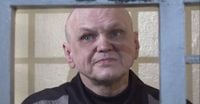Maxim Petrov, a notorious serial killer known as "Doctor Death," is reportedly seeking early parole after spending 25 years in the "White Swan" colony in Solikamsk. Petrov, who was sentenced to life imprisonment for a series of heinous crimes, is now aiming to return to his hometown of St. Petersburg if his application is approved.
Petrov, 59, gained infamy for his methodical approach to crime, which included posing as a medical professional to gain the trust of his elderly victims. He would inject them with lethal doses of sedatives before robbing their homes. His criminal activities spanned from 1997 to 2000, during which he committed 46 robberies and is confirmed to have murdered 11 individuals.
According to reports by SHOT, the possibility of Petrov's parole hinges on his behavior in prison. If he receives a positive evaluation and avoids any major violations in the last four years of his incarceration, the colony's administration may approve his request. The court will ultimately decide whether to grant him early release.
Experts suggest that Petrov's chances of being granted parole are slim. Eva Merkacheva, a member of the Human Rights Council under the President of Russia, stated that the likelihood of early release for someone with Petrov's criminal history is virtually nonexistent. She noted that there have been no precedents for releasing life-sentenced inmates in Russia, despite many having served over 25 years.
Petrov's criminal career is marked by a chilling pattern. Initially, he committed burglaries without resorting to violence. However, after being caught at the scene of a crime in 1999, he escalated his methods. His first murder occurred when he was surprised by the daughter of one of his victims. In a panic, he struck her with a dumbbell and strangled her father, marking the beginning of a more violent phase in his criminal activities.
In the following years, he refined his approach, using lethal injections and setting fire to the homes of his victims to cover his tracks. Not only did he steal money and valuables, but he also took items as trivial as food from their kitchens. This calculated cruelty earned him the nickname "Doctor Death."
Petrov was apprehended on January 17, 2000, after a lengthy investigation that involved around 700 law enforcement officers. His capture came during an attempt to rob another elderly victim. During the arrest, he attempted to convince officers that he was a doctor and that they had made a mistake. However, he was quickly subdued and found in possession of various incriminating items, including syringes filled with sedatives and stolen property.
After his conviction in November 2003, Petrov was sentenced to life imprisonment, and he has been serving his sentence in the "White Swan" facility since 2004. His case has drawn significant media attention, particularly as discussions around his potential release have resurfaced.
Despite Petrov's attempts to appeal his conviction and improve his conditions in prison, he has faced numerous setbacks. In 2012, the European Court of Human Rights awarded him compensation for poor conditions in pre-trial detention, but this did little to alleviate his situation.
As the date for his potential parole approaches, public sentiment remains divided. Some express outrage at the thought of Petrov being released, citing the severity of his crimes and the impact on the families of his victims. Others argue for the principles of rehabilitation and the possibility of change over a quarter-century of incarceration.
The legal framework in Russia allows life-sentenced prisoners to apply for parole after serving 25 years, which Petrov is now eligible for. However, the criteria for approval include a clean disciplinary record and positive recommendations from prison authorities, both of which are under scrutiny in Petrov's case.
In light of the recent discussions around Petrov's potential release, it is essential to consider the broader implications of such decisions. The case raises questions about justice, rehabilitation, and the societal responsibility to protect vulnerable populations from individuals with a history of violent crime.
As it stands, the court's decision regarding Petrov's application for early release will be closely watched, not only for its impact on the families of his victims but also for its significance in the ongoing discourse about crime and punishment in Russia.
Whether or not Petrov will succeed in his bid for freedom remains uncertain, but the conversation surrounding his case continues to highlight the complexities of the criminal justice system.








